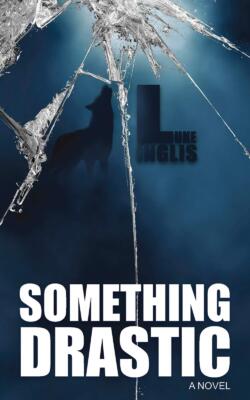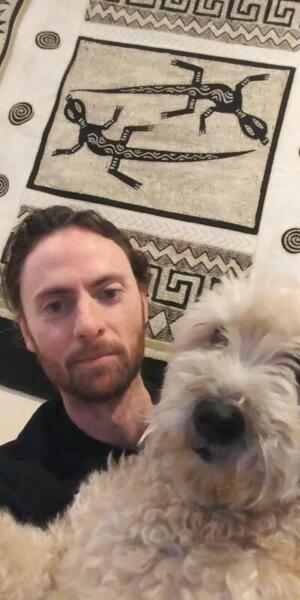1259 Hell-bent on self-destruction
Something Drastic
by Luke Inglis
Surrey: Now or Never Publishing, 2020
$19.95 / 9781989689080
Reviewed by Heather Graham
*
 In terms of action, Something Drastic is a novel that will not disappoint: six murders, five deaths by misadventure, eco-terrorism, wolf attacks, encounters with Sasquatch. Then there’s the biggest action of all: the apocalypse, the end of the human race, if not the planet. That’s quite a lot to ask of a novel that takes up fewer than two hundred pages of printed text, and a lot more than most writers would want to tackle in a single story, but in this, his debut literary offering, Sunshine Coast resident Luke Inglis has taken up the challenge.
In terms of action, Something Drastic is a novel that will not disappoint: six murders, five deaths by misadventure, eco-terrorism, wolf attacks, encounters with Sasquatch. Then there’s the biggest action of all: the apocalypse, the end of the human race, if not the planet. That’s quite a lot to ask of a novel that takes up fewer than two hundred pages of printed text, and a lot more than most writers would want to tackle in a single story, but in this, his debut literary offering, Sunshine Coast resident Luke Inglis has taken up the challenge.
Perhaps Inglis’s authorial boldness is the explanation for the attention he has attracted since Something Drastic was published last year — more attention than the author of a first novel from a small independent press usually garners: an interview in the September 30, 2020 issue of The Miramichi Reader; a short Q&A in the December 18, 2020 issue of the Vancouver Sun; and the third instalment of Inglis’s time in the literary limelight, an interview in the March 18, 2021 issue of The Ormsby Review, this very publication.
To date, however, and despite all this interest in the author, there have been no reviews of Something Drastic itself. Two positive comments on the web site Goodreads from people who rated it four stars, but no actual reviews. Inglis’s publisher, Surrey-based Now Or Never, obviously believed that the book had merit, because they were willing to put time and money behind it. Did they expect a bestseller? Probably not. Did they hope to make a meaningful contribution to the Canadian literary canon? Maybe. Or maybe not. Maybe it was a gamble on a new author who had penned a kind of story that, for some reason, they wanted to be associated with.

Which raises the question: Given the interest of a commercial publisher, not to mention the interviewers who were so eager to converse with its author, exactly what kind of a story are readers being offered in Something Drastic? First and foremost, it’s a comic novel of a particular variety: not just a tale that contains funny bits, but with something fundamentally off-kilter about it. The settings may resemble the physical reality we all recognize, but what happens in that world is very different from how things work in real life. Think unlikely, improbable, impossible, and you’re on the right track. It’s a work that sets its own terms. It follows, therefore, that what is needed here, as Coleridge so famously advised, is a “willing suspension of disbelief.” In other words, readers should leave their plausibility meter at the door when entering this particular world.
The protagonist of Something Drastic is Earl Qume. Earl is a very bad boy, and right from the get-go, Inglis is going to make sure we know it. Boorish behaviour, such as vomiting into his wastebasket at work or into the kitchen sink at home. Rudeness, even unkindness, towards others, such as this abuse hurled at the mother of a small child: “Did that ugly creature mangle your vagina?” After he is laid off by his employer, Mr. Bossman (yes, that’s correct), Earl drops by the desk of his loathed co-worker, Murphy (who incidentally is having an affair with Earl’s wife) to deliver what he intends as his coup de grâce: “Earl unzipped his pants and squirted canary-yellow urine in Murphy’s face.”
Why so much obnoxious behaviour on Earl’s part? In The Ormsby Review interview, Inglis offered this explanation for his protagonist: “I wanted to create a character who was seemingly beyond redemption.” And what Earl needs redeeming from is his alcoholism; he is a man in the grip of an addiction, and hell-bent, it would seem, on self-destruction.

Having established Earl’s need for rescue, Something Drastic turns to the business of sending in the rescuers. The janitor in Earl’s office building presses something on the beleaguered young man, a brochure advertising Wanderland Adventures. “Take the trip. Everything has been arranged,” the janitor tells Earl. At an AA meeting, Earl meets Randolph, a man with his own unconventional backstory, who takes on the cause of Earl’s sobriety, and the two of them flee Toronto in Randolph’s private plane, on the run from the law (Earl has murdered his nemesis Murphy). Next stop: somewhere on the British Columbia-Alberta border, location of Wanderland Adventures.
The novel now settles into a new phase, where the focus is on five men and one woman who adopt the name Clovis Redux (lots of symbolic meaning there) for their small group, led by the enigmatic Wolfgang Yellowbird, wilderness guru. The adventurers head out on a camping trip that will progress from one violent episode to another, culminating in fire, earthquake, tsunami — all the markers of an impending apocalypse. But is this really the end? In the final chapter of the novel, Earl and a resurrected Murphy are sitting in a Toronto bar, enjoying a drink together and discussing baseball. A second chance for Earl? A new beginning for planet Earth and the human race? Or, perhaps, a prequel to all previous events — Earl before he fell victim to alcoholism?
Not surprisingly, it takes some pretty determined writing to keep a vast narrative edifice like Something Drastic from collapsing under its own weight. Inglis definitely has a way with words, but his use of language is not so much a style, as an organized campaign of verbal jolts. Here is a description of Earl in the throes of sexual arousal: “His penis slathered tears of pre-ejaculate that slimed into the hairs of his inner thighs.” Or Earl upon first awakening: “He felt bits of food alight from the fissures between his molars, suggesting nuttiness and decrying the hunger that growled from his shrunken gut.” Not all of the writing is this startling, but without question it is all this audacious.
To use a term sometimes applied to someone or something that is less than a success but undeniably attractive, Something Drastic might be described as a ‘hot mess:” unruly, at times seemingly out of control, always unapologetically preposterous. The attractiveness is in the novel’s sheer exuberance. Admittedly, however, at times it’s all a little overwhelming; too much of a good thing, perhaps, or maybe just too much, period. The kind of high-spirited linguistic and narrative playfulness that can wear a person down and leave you feeling exhausted. At one point in his interview with The Miramichi Reader, Inglis made this observation: “Writing is hard, man.” Yes, indeed, it is hard; and sometimes so is reading.
*

Heather Graham worked as an editor for nearly thirty years, and during that same time made more than one foray into the seductive but fraught business of bookselling. Now officially retired, she indulges her bookish inclinations by taking on the occasional editing project, as well as trying her hand at the storytelling process itself and doing some of her own writing. She lives on Malcolm Island in Queen Charlotte Strait. Editor’s note: Heather Graham has also reviewed books by Susan Olding, Bernice Friesen, Traci Skuce, Michael Christie, Anny Scoones, Alexander Laidlaw, Jennifer Butler, and Terry Milos for The Ormsby Review.
*
The Ormsby Review. More Books. More Reviews. More Often.
Publisher and Editor: Richard Mackie
The Ormsby Review is a journal service for in-depth coverage of BC books and authors. The Advisory Board consists of Jean Barman, Wade Davis, Robin Fisher, Cole Harris, Hugh Johnston, Kathy Mezei, Patricia Roy, Maria Tippett, and Graeme Wynn. Scholarly Patron: SFU Graduate Liberal Studies. Honorary Patron: Yosef Wosk. Provincial Government Patron since September 2018: Creative BC
“Only connect.” – E.M. Forster































One comment on “1259 Hell-bent on self-destruction”